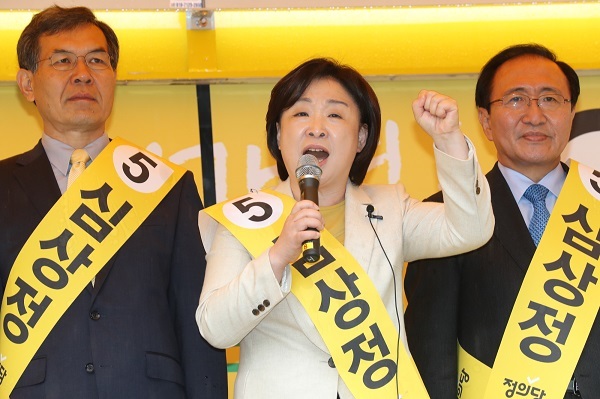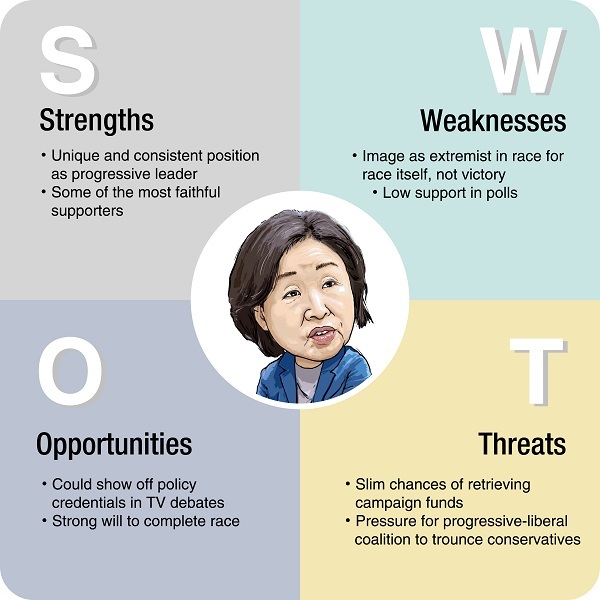The Korea Herald is publishing a series of articles on major contenders in the forthcoming May 9 presidential election, using a SWOT analysis to present their strengths, weaknesses, opportunities and threats. Below is the fifth and final installment on Sim Sang-jeung of the progressive Justice Party. – Ed.

Rep. Sim Sang-jeung of the Justice Party (Yonhap)
In South Korea’s crowded field of presidential candidates, Rep. Sim Sang-jeung stands out in more ways than one.
She is the only woman -- a fiercely independent one unlike the “princess” Park Geun-hye whom voters last elected to be their president. A fighter to the core, the former labor activist does not shy away from sensitive issues such as gay rights and abortion, but at the same time has a surprisingly soft and likable image.
Sim is also the only candidate from a major political party who does not hail from South or North Gyeongsang provinces. She was born in Paju, just north of Seoul, in 1959.
StrengthsSim’s stance on key state policies has been quite consistent throughout her political career compared to other presidential hopefuls: they are the farthest to the left side of the political spectrum.
She led the campaign to oppose the South Korea-US Free Trade Agreement a decade ago, which is her key differentiating point from the candidate of the liberal Democratic Party of Korea, Moon Jae-in.
Sim’s consistency and unwavering commitment to progressive values is the reason why she has some of the most steadfast and faithful supporters who put the three-term lawmaker among the top recipients of political donations.
WeaknessesFor Sim, the biggest challenge comes from the traditional rivalry between liberals and conservatives, which even divided the country geographically into the liberal Jeolla and the conservative Gyeongsang provinces.
Amid the two’s vested rights and electoral battles over the past decades, far-left candidates have often been pressured to resign for the sake of a victory for the liberals or form a united front against the conservatives.
It is also estimated that a sizable number of progressive supporters choose liberal candidates at polls in order to prevent their ballots from being “wasted.”
According to opinion polls, Sim’s support rating stands below 4 percent, lower than that of her party, which hovers at around 6 percent.
OpportunitiesIn two previous presidential elections, progressive candidates quit midway, trapped in the “progressive-liberal shared destiny” mindset.
Knowing this, Sim has declared a race to the finish line, no matter what.
Sim’s camp is aiming for a double-digit score in voter support, pinning hopes on TV debates. Camp officials say the candidate has already shown off her resolute manner and policy credentials in the first round of the televised session Thursday.
Though few see a real chance of Sim winning the May 9 presidential election, she could woo new supporters and boost the political weight of herself and her party in the post-election political landscape, analysts say.
ThreatsMoney matters. Any candidate and his or her affiliated political party could be saddled with heavy debt as the National Election Commission only fully compensates campaign costs for those with ballots of at least 15 percent.
Furthermore, those failing to grab 10 percent of votes will have to bear the full campaign cost, as not a single won will be recouped via the state fund.
If Sim drops her bid midway again, she could face heavy criticism from her core supporters who, despite the concern of “wasted votes,” were willing to stick with her. There is a possibility that Sim will come under pressure to resign and endorse Moon Jae-in from the liberal Democratic Party to beat Ahn Cheol-soo of the People’s Party.
By Kim Yon-se (kys@heraldcorp.com)


![[Exclusive] Korean military set to ban iPhones over 'security' concerns](http://res.heraldm.com/phpwas/restmb_idxmake.php?idx=645&simg=/content/image/2024/04/23/20240423050599_0.jpg&u=20240423183955)




![[Herald Interview] 'Amid aging population, Korea to invite more young professionals from overseas'](http://res.heraldm.com/phpwas/restmb_idxmake.php?idx=645&simg=/content/image/2024/04/24/20240424050844_0.jpg&u=20240424200058)